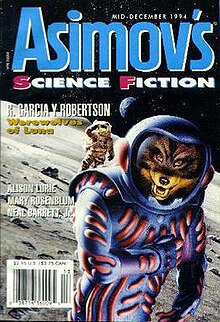Asimov's Science Fiction
 Cover for an issue of Asimov's Science Fiction | |
| Editor | Sheila Williams |
|---|---|
| Categories | Science Fiction |
| Frequency | Ten times a year |
| Circulation | 22,593 |
| Publisher | Penny Publications |
| Founded | 1977 |
| First issue | December 1977 |
| Country | United States |
| Based in | Norwalk, Connecticut |
| Language | English |
| Website | Asimov's Science Fiction |
| ISSN | 1065-2698 |
| OCLC | 26559528 |
Asimov's Science Fiction (ISSN 1065-2698) is an American science fiction magazine which publishes science fiction and fantasy and perpetuates the name of author and biochemist Isaac Asimov. It is currently published by Penny Publications 10 times a year, with double issues in April/May and October/November.[1]
Circulation in 2012 was 22,593, as reported in the annual Locus magazine survey.[2]
History
Asimov's Science Fiction began life as the digest-sized Isaac Asimov's Science Fiction Magazine (or IASFM for short) in 1977. Joel Davis of Davis Publications approached Asimov to lend his name to a new science fiction magazine, after the fashion of Ellery Queen's Mystery Magazine or Alfred Hitchcock's Mystery Magazine. Asimov refused to act as editor, but served instead as editorial director, writing editorials and replying to reader mail until his death in 1992. At Asimov's request George Scithers, the first editor, negotiated an acquisitions contract with the Science Fiction Writers of America providing considerably better terms for writers than had been the periodical standard up to that time.
Initially a quarterly, its first issue was dated December 1977.[3] It changed to a bimonthly in 1978 and began publishing monthly in 1979. In the mid-1980s it was published once every four weeks, with an extra "mid-December" issue. Double issues were added in the early 1990s before the schedule was scaled back to the present 10 issues per year.
The magazine was sold to Bantam Doubleday Dell in January 1992, a few months before Asimov's death, and the title changed to Asimov's Science Fiction. In 1996, Dell Magazines was acquired from BDD by Crosstown Publications, and as of 2012 is part of Penny Publications which is under the same ownership as Crosstown Publications has been, with headquarters in Norwalk, Connecticut and uses a combined Customer Service labelled Penny Press/Dell Magazines.[4] In 1998, the magazine's size changed; it is now taller and slightly wider than the standard digest format (matching other magazines published by its newest corporate parent).
Asimov's Science Fiction celebrated its thirtieth anniversary in 2007, with an anthology edited by the magazine's current editor, Sheila Williams. Drawing on stories published from 1977 to the present day, it was published by Tachyon Publications.
Martin Gardner wrote a regular column of "puzzle tales" for the magazine from 1977 to 1986. He produced 111 columns in all, many later published in book form.
Editors
- George H. Scithers, 1977–1982
- Kathleen Moloney, 1982 [interim]
- Shawna McCarthy, 1983–1985
- Gardner Dozois, 1986–2004
- Sheila Williams, 2004–present
Scithers left the magazine after five years, winning two Hugo awards as best editor, and was succeeded by Shawna McCarthy. McCarthy held the position for three years, winning one Hugo award. Gardner Dozois edited the magazine from 1985 to 2004, winning 15 Hugo awards, before stepping down and becoming its contributing editor. Sheila Williams is the current editor and won the Hugo Awards for Best Short Form Editor in 2011.[5]
Authors published in Asimov's Science Fiction
- Brian W. Aldiss
- Neal Asher
- Isaac Asimov
- Paolo Bacigalupi
- Stephen Baxter
- Elizabeth Bear
- Gregory Benford
- Damien Broderick
- Pat Cadigan
- Orson Scott Card
- Glen Cook
- Paul Cornell
- Greg Egan
- Harlan Ellison
- John M. Ford
- Karen Joy Fowler
- Carl Frederick
- William Gibson
- Joe Haldeman
- Kij Johnson
- Janet Kagan
- Michael Kandel
- James Patrick Kelly
- Mary Robinette Kowal
- Nancy Kress
- Ursula K. Le Guin
- Jonathan Lethem
- Kelly Link
- Ian R. MacLeod
- Daniel Marcus
- George R.R. Martin
- David Marusek
- Jay A. Parry
- Frederik Pohl
- Robert Reed
- Mike Resnick
- Joel Rosenberg
- Mary Rosenblum
- Kristine Kathryn Rusch
- Lucius Shepard
- Robert Silverberg
- S. P. Somtow
- Brian Stableford
- Allen Steele
- Bruce Sterling
- Michael Swanwick
- Karen Traviss
- Harry Turtledove
- Fran Wilde
- Kate Wilhelm
- Connie Willis
See also
- Asimov on Science Fiction
- Science Fiction by Asimov
- Asimov's SF Adventure Magazine
- List of literary magazines
References
- ^ "Home". Penny Publications.
- ^ Locus, February 2012 issue.
- ^ Michael Ashley (January 1, 2007). Gateways to Forever: The Story of the Science-fiction Magazines from 1970 to 1980. Liverpool University Press. p. 309. ISBN 978-1-84631-003-4. Retrieved January 4, 2016.
- ^ "Contact Customer Service". Penny Publications.
- ^ "The Locus Index to SF Awards: Hugo Nominees List". Locusmag.com.
External links
- Asimov's Science Fiction (official web site)
- A Brief History of Asimov's Science Fiction Magazine
- Wood TV 8 report
- Response to News 8 (from the magazine)
